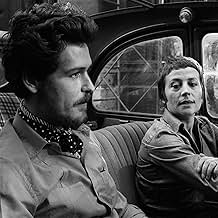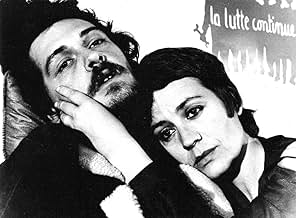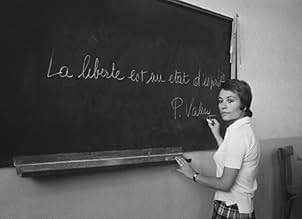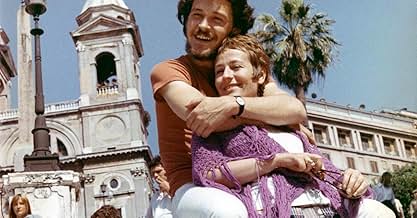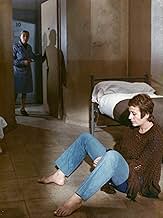VALUTAZIONE IMDb
6,9/10
698
LA TUA VALUTAZIONE
Aggiungi una trama nella tua linguaRouen, France, 1968: Danièle is an unconventional French teacher. Every morning she takes her pupil Gérard to school. He flirts with her and she reciprocates his affection. This brings the p... Leggi tuttoRouen, France, 1968: Danièle is an unconventional French teacher. Every morning she takes her pupil Gérard to school. He flirts with her and she reciprocates his affection. This brings the parents and the school authorities onto the scene.Rouen, France, 1968: Danièle is an unconventional French teacher. Every morning she takes her pupil Gérard to school. He flirts with her and she reciprocates his affection. This brings the parents and the school authorities onto the scene.
- Regia
- Sceneggiatura
- Star
- Premi
- 2 candidature totali
Marcelle Ranson-Hervé
- Madame Jaias - la voisine
- (as Marcelle Ranson)
Marianik Revillon
- Cécile
- (as Mariannik Revillon)
Recensioni in evidenza
It is a so poignant, gripping movie, this film that can evoke SUMMER OF 43, but from another angle, told in a different manner. Here, the huge surprise is that it is question of a case of an embezzlement of a minor, involving a thirty-forty years old woman being in love with a young man; it is usually the contrary !!! I have never seen such a case before. The relationship between a mature woman and a young man under age. We can compare and analyze the differents and elements in common. Andre Cayatte was the best director for this tale, a social depiction of the 1968 France, the atmosphere, spirit, soul of this period that changed so many things in the world. Powerful performances that we can't deny. I am afraid that many people forgot this film. Such a shame. I guess that's the film that made Annie Girardot this so terrific for several generations. But a very sad story too.
More than 50 years have passed since the film 'Mourir d'aimer' was made and released on screen, one of the blockbusters of French cinema in 1971. Watching or rewatching it today is a good opportunity to appreciate how approaches have changed since - both cinematic, but also legally and mentally - about relationships between people separated by significant age differences, but also to what extent many things remained the same, or could be judged more severely in our times of political correctness. André Cayatte, the film's director and co-writer, a lawyer by training, also a writer and a journalist, had a passion for bringing to the screens interesting and complex cases that had passed in one form or another through the French justice system. Although the film begins with a confusing disclaimer that denies resemblance to real characters, 'Mourir d'aimer' is based on a true love story between a high school teacher and her student, who had made a sensation three years before, in the tumultuous year of 1968. The screen version of this story is interesting and the film is worth watching, both as a legal and moral document, but also for its consistent artistic qualities.
This movie has one of the most beautiful movie or book titles I know of: 'Mourir d'aimer' means 'to die of love'. However, the love story, which provides the emotional motivation for this case, is almost completely neglected. I think this was intentional. Writing the screenplay for the film, Cayatte almost completely avoided the romantic aspect in favor of a realistic rendering of the explosive social environment before and during the events of May 1968, including the joint involvement of teachers and students in protest movements against the system. What followed is thus presented as a kind of violent reaction or even retaliation by the system against the protesters. This would be a pretty interesting plot by itself, but the love story, with all its beauty and its controversies is almost completely ignored at first, and presented with short and superficial scenes later. The choice of actors also contributes to this feeling. Annie Girardot plays the role of the politically-involved teacher, who is also a beautiful, divorced woman with two children, finely describing the phases of her personal attitude - from the safe-confidence of the woman who knows her rights, to the revolt against the oppressive system, and at last the despair of defeat. However, the reasons why the heroine overcomes moral and professional taboos and transforms the teacher-student relationship into what should be a stormy and tragic love story remain unclear. The role of her student and boyfriend is played by Bruno Pradal, an actor launched by this film and whose career was tragically cut by a car accident, but who does not have the charm and charisma to emotionally justify, on screen, the relationship between the two.
We are left with that part of the story that fits perfectly with André Cayatte - the judicial mechanism set in motion by the boy's parents' complaint, the criminal complicity of the various components of the system, starting with the hypocrisy of the teaching staff, going through psychiatric examinations and abusive hospitalizations, to the rigidity of the judicial system. The bright counterpoint is provided by the group of high school students, the generation raised in the atmosphere of the 1968 protest movements, which would largely change French society in the coming decades. From a contemporary perspective, however, we cannot but ask ourselves how such a case would be judged socially and in the media today. 'Mourir d'aimer' is a tragic love story set on an interesting historical background, a film in which the background image is clearer than the silhouettes of the foreground lovers.
This movie has one of the most beautiful movie or book titles I know of: 'Mourir d'aimer' means 'to die of love'. However, the love story, which provides the emotional motivation for this case, is almost completely neglected. I think this was intentional. Writing the screenplay for the film, Cayatte almost completely avoided the romantic aspect in favor of a realistic rendering of the explosive social environment before and during the events of May 1968, including the joint involvement of teachers and students in protest movements against the system. What followed is thus presented as a kind of violent reaction or even retaliation by the system against the protesters. This would be a pretty interesting plot by itself, but the love story, with all its beauty and its controversies is almost completely ignored at first, and presented with short and superficial scenes later. The choice of actors also contributes to this feeling. Annie Girardot plays the role of the politically-involved teacher, who is also a beautiful, divorced woman with two children, finely describing the phases of her personal attitude - from the safe-confidence of the woman who knows her rights, to the revolt against the oppressive system, and at last the despair of defeat. However, the reasons why the heroine overcomes moral and professional taboos and transforms the teacher-student relationship into what should be a stormy and tragic love story remain unclear. The role of her student and boyfriend is played by Bruno Pradal, an actor launched by this film and whose career was tragically cut by a car accident, but who does not have the charm and charisma to emotionally justify, on screen, the relationship between the two.
We are left with that part of the story that fits perfectly with André Cayatte - the judicial mechanism set in motion by the boy's parents' complaint, the criminal complicity of the various components of the system, starting with the hypocrisy of the teaching staff, going through psychiatric examinations and abusive hospitalizations, to the rigidity of the judicial system. The bright counterpoint is provided by the group of high school students, the generation raised in the atmosphere of the 1968 protest movements, which would largely change French society in the coming decades. From a contemporary perspective, however, we cannot but ask ourselves how such a case would be judged socially and in the media today. 'Mourir d'aimer' is a tragic love story set on an interesting historical background, a film in which the background image is clearer than the silhouettes of the foreground lovers.
The kind of role in which the talented, unique Annie Girardot was an expert. A film, like many others, that could not run on Romanian screens before 1989, but about which, like about many others, they wrote in the Cinema magazine led by Ecaterina Oproiu. That, in order to understand a little bit how perverse the communist regime was in that period in Romania, where I lived then: they banned a movie about a society that banned love. The film it's kind of a modern Romeo and Juliet, a little bit different. Made after a real event in France. One of the best roles played by Annie Girardot.
Note that a number of female American high school teachers have been sent to jail for what we are asked to view as a touching love story here. And in fact so many French viewers seem to regard it. For many American viewers, I think it will be hard, today, to view it with such equanamity, even if the (legally) victim here looks beyond his years (and apparently did in the real life case). But then I've met several girls from thirteen to fifteen who looked to be twenty - try making a film about a male teacher having an affair with one of THEM. Basically, if you want to understand why so many French intellectuals think Polanski's rape of a thirteen year old was no big deal, this film will give you some insight. Beyond that, it's a very dry style of filmmmaking, where the strongest passion on all sides seems to be anger. Supposedly these two can't keep away from each other, but there is zero sensuality in their interactions; they seem far more interested in talking about their persecuters than in each other's bodies (meanwhile, one lesbian scene makes it clear the filmmaker is not shy about naked bodies). It's also surprising to suddenly see the teacher concerned about losing custody of her children, whom we never see until late in the film and who don't seem in the least to concern her until legal stirrings raise the issue. When her ex-husband suddenly appears, it is downright jarring. Emotionally, the most powerful moments are with others, not between the two protaganists. Which is to say even if I didn't have moral reservations about the whole premise, I think I'd have trouble caring very much about the main character.
A forbiden love story between a Literature teacher and her minor student. And more. The film remains a manifesto about social perspectives , prejudices, image of the other, hypocrisy and Mai 1968. And, after ahalf of century, it is a realistic portrait o today.
Sure, being myself teacher, I am very subjective about theme. I admire the beautiful acting of Annie Girardot and wise way to explore his character of Bruno Pradal. An impressive story, a real case and way to influence the lives of other based by deep selfishness and large forms of hipocrisy.
Sure, being myself teacher, I am very subjective about theme. I admire the beautiful acting of Annie Girardot and wise way to explore his character of Bruno Pradal. An impressive story, a real case and way to influence the lives of other based by deep selfishness and large forms of hipocrisy.
Lo sapevi?
- QuizContrary to popular belief, Aznavour's song is not in the soundtrack of the movie.
- ConnessioniFeatured in Legendy mirovogo kino: Annie Girardot
I più visti
Accedi per valutare e creare un elenco di titoli salvati per ottenere consigli personalizzati
Dettagli
- Data di uscita
- Paesi di origine
- Siti ufficiali
- Lingua
- Celebre anche come
- Umreti od ljubavi
- Luoghi delle riprese
- Rouen, Seine-Maritime, Francia(location)
- Aziende produttrici
- Vedi altri crediti dell’azienda su IMDbPro
Contribuisci a questa pagina
Suggerisci una modifica o aggiungi i contenuti mancanti

